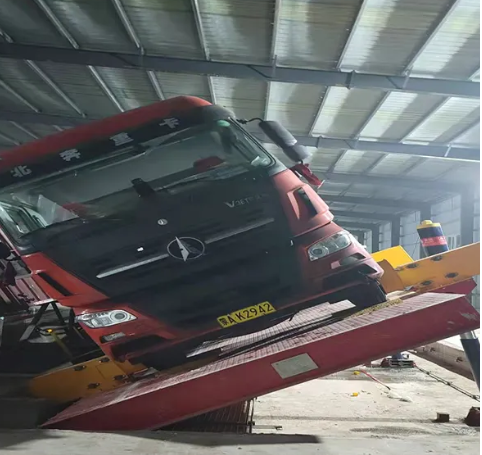ข้อได้เปรียบหลักของ Tipper trucks เหนือกว่าเมธอดการขนถ่ายแบบดั้งเดิม
ประสิทธิภาพไฮดรอลิกเทียบกับแรงงานคน
ปัจจุบันรถเททิ้งส่วนใหญ่พึ่งพากระบวยดรอิกในการเทสินค้า ซึ่งถ้าพูดถึงความเร็วแล้ว กระบวยดรอิกนั้นเหนือกว่าแรงงานคนแบบเดิมๆ อย่างชัดเจน กระบวยดรอิกยังทำงานได้แม่นยำมาก จึงลดโอกาสเกิดอุบัติเหตุในบริเวณพื้นที่ก่อสร้างขณะที่ผู้ขับขี่กำลังปฏิบัติงานอยู่ ตามที่มีการวิจัยจากนิตยสารเครื่องจักรก่อสร้างบางฉบับระบุว่า รถเทที่ใช้กระบวยดรอิกสามารถเทวัสดุได้เร็วกว่ารุ่นเก่าถึงสองเท่า ความเร็วที่เพิ่มขึ้นแบบนี้ ส่งผลให้เกิดความแตกต่างอย่างชัดเจนในพื้นที่ก่อสร้างที่เวลาเป็นสิ่งสำคัญ นอกจากนี้ยังช่วยเพิ่มความปลอดภัยมากขึ้นด้วย แต่สิ่งที่โดดเด่นที่สุดคือประสิทธิภาพที่ช่วยให้โครงการต่างๆ ดำเนินการเสร็จสิ้นได้เร็วกว่าแต่ก่อน
ประหยัดเวลาในงานก่อสร้างและการเหมืองแร่
รถบรรทุกเททิ้งมีความสำคัญอย่างมากในการทำให้การทำงานที่ไซต์งานก่อสร้างและเหมืองแร่ดำเนินไปอย่างรวดเร็ว เนื่องจากช่วยลดเวลาในการขนย้ายวัสดุต่าง ๆ อย่างมาก รถบรรทุกเหล่านี้สามารถเททิ้งวัสดุได้อย่างรวดเร็ว ซึ่งหมายความว่าผู้ขับขี่สามารถทำการขนส่งได้มากขึ้นในแต่ละวัน ความสามารถเพิ่มเติมนี้ช่วยให้โครงการต่าง ๆ แล้วเสร็จได้เร็วขึ้น และเพิ่มประสิทธิภาพโดยรวมของการดำเนินงาน โดยข้อมูลจากแหล่งจริงแสดงให้เห็นว่า บริษัทที่ใช้รถบรรทุกเททิ้งสามารถประหยัดเวลาในการขนส่งวัสดุจากจุดหนึ่งไปยังอีกจุดหนึ่งได้ประมาณ 30 เปอร์เซ็นต์ การประหยัดเวลาในระดับนี้ส่งผลอย่างมากต่อประสิทธิภาพในการทำงานโดยรวมในแต่ละวัน
ความหลากหลายในการใช้งานกับวัสดุต่างๆ (ทราย กรวด และเศษขยะจากการรื้อถอน)
รถเทรลเลอร์แบบเททิ้งถูกออกแบบมาเพื่อขนส่งของหลากหลายชนิดตั้งแต่ทรายและกรวดไปจนถึงคอนกรีตที่แตกเป็นชิ้นๆ และเศษซากจากการรื้อถอน ทำให้รถประเภทนี้มีความหลากหลายในการใช้งานบนไซต์ก่อสร้าง ซึ่งหมายความว่ารถเพียงคันเดียวสามารถทำงานแทนรถหลายประเภทได้ ช่วยลดความยุ่งยากในการจัดการรถขนส่งหลายประเภทในเวลาเดียวกัน และยังช่วยประหยัดค่าใช้จ่ายอีกด้วย จากข้อมูลของอุตสาหกรรม บริษัทที่เปลี่ยนมาใช้รถเทรลเลอร์แบบอเนกประสงค์มักจะเห็นการลดลงของค่าใช้จ่ายในการดำเนินงานประจำวันประมาณ 15 เปอร์เซ็นต์ ประเภทของค่าใช้จ่ายที่ประหยัดได้นี้จะเพิ่มขึ้นอย่างรวดเร็วเมื่อพิจารณาค่าใช้จ่ายในระยะยาวสำหรับองค์กรใดๆ ที่เกี่ยวข้องกับการขนส่งวัสดุเป็นประจำ
การสึกหรอน้อยกว่าเมื่อเปรียบเทียบกับระบบสายพานหรือคอนเวเยอร์
ระบบสายพานและระบบลำเลียงมักจะเสียหายบ่อยตามระยะเวลาที่ใช้งาน แต่รถเทท้ายถูกสร้างมาให้มีอายุการใช้งานที่ยาวนานกว่า ซึ่งหมายความว่าต้องซ่อมแซมน้อยลงและมีช่วงเวลาที่เครื่องจักรหยุดทำงานลดลงโดยรวม การบำรุงรักษาสายพานลำเลียงอย่างสม่ำเสมอทำให้ธุรกิจต้องเสียค่าใช้จ่ายจำนวนมาก โดยมักต้องปรับแต่งและเปลี่ยนชิ้นส่วนอยู่ตลอดเวลา แม้ว่ารถเทท้ายจะต้องการการดูแลรักษาไม่มากนักระหว่างช่วงบริการ แต่ยังคงให้สมรรถนะที่เชื่อถือได้ทุกวัน งานวิจัยแสดงให้เห็นว่า บริษัทที่เปลี่ยนมาใช้รถเทท้ายมักจะใช้จ่ายในการซ่อมแซมตลอดอายุการใช้งานรถลดลงประมาณ 20 ถึง 25 เปอร์เซ็นต์ เมื่อเทียบกับผู้ที่ยังใช้ระบบสายพานลำเลียงแบบดั้งเดิม ผลจากการประหยัดนี้ส่งผลโดยตรงให้กับกำไรของบริษัทในภาคอุตสาหกรรมต่าง ๆ
การเปรียบเทียบต้นทุนการดำเนินงาน: Tipper trucks เมื่อเปรียบเทียบกับการขนส่งแบบเดิม
ประสิทธิภาพการใช้น้ำมันในงานรถเทียมเหมืองหิน
รถบรรทุกตักหินแบบควอรีมีความโดดเด่นเรื่องการประหยัดเชื้อเพลิง ซึ่งเป็นเหตุผลว่าทำไมผู้ประกอบการจำนวนมากจึงเลือกใช้รถประเภทนี้สำหรับงานขนส่งระยะไกลในพื้นที่เหมืองแร่ ตามข้อมูลทางอุตสาหกรรมล่าสุด รถบรรทุกเฉพาะทางเหล่านี้สามารถประหยัดเชื้อเพลิงได้ราว 12-18% เมื่อเทียบกับรถบรรทุกทั่วไปที่วิ่งเส้นทางเดียวกัน สำหรับธุรกิจที่ต้องดำเนินการหลายกะต่อเนื่องกันทุกวัน ยอดการประหยัดเชื้อเพลิงในระดับนี้สามารถเพิ่มขึ้นอย่างรวดเร็ว และยังช่วยลดการปล่อยก๊าซเสียที่เป็นอันตรายอีกด้วย อย่างไรก็ตาม สิ่งที่กำลังผลักดันรถบรรทุกเหล่านี้ให้ก้าวไปข้างหน้าคือเทคโนโลยีเครื่องยนต์รุ่นใหม่ที่เพิ่งออกสู่ตลาดเมื่อเร็ว ๆ นี้ ผู้ผลิตต่างพากันปรับปรุงระบบการเผาไหม้ และเพิ่มคุณสมบัติการจัดการเชื้อเพลิงอัจฉริยะที่ใช้งานได้จริงภายใต้สภาพแวดล้อมทั่วไป ไม่ใช่แค่ในห้องทดลองเท่านั้น ซึ่งหมายความว่า น้ำมันดีเซลเผาไหม้ได้สะอาดยิ่งขึ้น และลดจำนวนอนุภาคขนาดเล็กที่ลอยขึ้นสู่ชั้นบรรยากาศระหว่างการเดินทางระยะไกลจากพื้นที่เหมืองไปยังโรงงานแปรรูป
การลดต้นทุนแรงงานผ่านระบบการเทอัตโนมัติ
การดำเนินการเทท้ายรถบรรทุกแบบอัตโนมัติช่วยลดต้นทุนแรงงานในขณะที่ทำให้กระบวนการดำเนินงานราบรื่นขึ้นโดยรวม เมื่อมีระบบอัตโนมัติเหล่านี้เข้ามาแทนที่ บริษัทต่างๆ จำเป็นต้องใช้แรงงานในการควบคุมเครื่องจักรน้อยลงมาก ทำให้ค่าใช้จ่ายด้านเงินเดือนลดลงในทางที่ดี ข้อมูลบางส่วนบ่งชี้ว่าธุรกิจสามารถประหยัดค่าแรงงานได้ราว 30% เมื่อเปลี่ยนจากการเทท้ายรถแบบดั้งเดิมมาเป็นระบบอัตโนมัติ ซึ่งเป็นเรื่องที่เข้าใจได้ โดยเฉพาะในตลาดที่แข่งขันกันสูงที่ทุกๆ ดอลลาร์ที่ประหยัดได้มีความหมาย บริษัทขนส่งมักมองหาวิธีลดต้นทุนโดยไม่ชะลอการผลิต และระบบอัตโนมัติประเภทนี้เองที่มอบข้อได้เปรียบในการแข่งขันเหนือคู่แข่งที่ยังพึ่งพาแรงงานคนอยู่
ค่าใช้จ่ายในการบำรุงรักษาต่ำกว่าระบบลม
รถเทท้ายประหยัดค่าบำรุงรักษาได้ดีกว่าระบบลมโดยรวม ด้วยโครงสร้างเชิงกลที่เรียบง่ายกว่า ทำให้เสียหายหรือขัดข้องน้อยลง และช่วยให้การดำเนินงานเป็นไปอย่างต่อเนื่องโดยไม่มีการหยุดชะงักที่รบกวนจิตใจ ตามข้อมูลอุตสาหกรรมบางส่วนที่เราได้เห็นมา บริษัทต่างๆ รายงานว่าประหยัดค่าใช้จ่ายในการดำเนินงานได้ประมาณ 40% ภายในระยะเวลา 5 ปี เมื่อเปลี่ยนจากการใช้ระบบลมมาเป็นรถเทท้าย สรุปแล้วคือการประหยัดเงินจริงๆ พร้อมทั้งมีระบบขนส่งที่ทำงานได้เชื่อถือได้ทุกวัน สำหรับธุรกิจที่พยายามบรรลุเป้าหมายโดยไม่มีปัญหาอุปกรณ์ขัดข้องอยู่ตลอดเวลา สิ่งนี้ทำให้เกิดความแตกต่างอย่างมากต่อการดำเนินงานในแต่ละวัน
ประเภทรถบรรทุกเทเฉพาะทางที่เพิ่มประสิทธิภาพการผลิต
รถบรรทุกเทซูเปอร์สำหรับสถานที่ที่มีความจุสูง
สําหรับงานก่อสร้างขนาดใหญ่ และการทําเหมืองแร่ ที่มีปริมาณสําคัญมากที่สุด รถขนของขนาดใหญ่โดดเด่นจากรุ่นปกติ เพราะมันพกของมากกว่า เรากําลังพูดถึงความจุเพิ่มขึ้นประมาณ 25% ซึ่งทําให้เกิดความแตกต่างมาก เมื่อขนย้ายดิน หิน หรือวัสดุอื่นๆ ในปริมาณใหญ่ ความจมหนักที่ใหญ่ขึ้น ทําให้ผู้ใช้งานไม่ต้องเดินทางไป-กลับระหว่างสถานที่ทํางานและพื้นที่กําจัด วิธีนี้ช่วยประหยัดทั้งเวลา และค่าน้ํามันในระหว่างโครงการ การ ทํา งาน ใน สถาน ที่ ที่ มี ความ ยิ่ง แม้ว่าการลงทุนครั้งแรกอาจดูเหมือนจะสูงมาก เมื่อเทียบกับรถบรรทุกธรรมดา แต่บริษัทมักพบว่าการได้อุปกรณ์แบบนี้ จะมีผลในระยะยาว เพราะมันช่วยให้รักษากําหนดเวลาที่เข้มงวดโดยไม่เสียสละระดับผลิตภาพประจําวัน
รถบรรทุกแบบอาร์ติเคิลในพื้นที่ขรุขระ
รถเทท้ายต่อพ่วงถูกออกแบบมาเพื่อใช้งานในพื้นที่ที่มีสภาพยากลำบาก ให้ผู้ขับขี่มีการควบคุมและเสถียรภาพที่ดีขึ้นเมื่อเจอสภาพทางที่ขรุขระ รถเหล่านี้สามารถทำงานได้ดีบนถนนที่เป็นหลุมบ่อหรือบริเวณที่เปียกโคลน ซึ่งรถบรรทุกทั่วไปมักจะมีปัญหา ทำให้การขนส่งวัสดุดำเนินไปอย่างต่อเนื่องไม่ว่าจะมีสภาพอากาศเช่นใด การศึกษาวิจัยแสดงให้เห็นว่า รถบรรทุกพิเศษเหล่านี้สามารถเพิ่มประสิทธิภาพการปฏิบัติงานได้ประมาณร้อยละ 20 ในสภาพแวดล้อมที่ยากลำบาก ซึ่งเป็นเหตุผลว่าทำไมไซต์งานก่อสร้างที่มีพื้นดินเป็นหินล้วนจึงมักพึ่งพาพวกมันอยู่เสมอ โครงสร้างของรถออกแบบมาให้ผู้ขับสามารถรักษาระดับรถไว้ได้ขณะเลี้ยวอย่างรวดเร็ว ลดความเสี่ยงอุบัติเหตุหรือความล่าช้าที่อาจเกิดขึ้นระหว่างการขนส่ง
รถเทข้างสำหรับโครงการก่อสร้างในเมือง
สำหรับงานก่อสร้างในเมืองที่ต้องทำงานในพื้นที่แคบและต้องการความแม่นยำในการเททิ้งวัสดุสูง รถบรรทุกเทข้าง (Side Tipper Trucks) มีความพิเศษที่โดดเด่น รถเหล่านี้ช่วยให้ทีมงานสามารถเทวัสดุลงพื้นที่ได้ทันทีข้างถนนแคบๆ โดยไม่ต้องเคลื่อนย้ายรถไปมา ช่วยลดเวลาและค่าใช้จ่ายที่เสียไป ตามการวิจัยล่าสุดเกี่ยวกับการพัฒนาเมือง การนำรถบรรทุกเฉพาะทางเหล่านี้มาใช้ในงานก่อสร้างในเมืองจริงๆ แล้วช่วยให้งานดำเนินไปได้อย่างราบรื่นมากขึ้น พร้อมทั้งลดปัญหาการจราจรติดขัด ถูกออกแบบมาโดยเฉพาะสำหรับสภาพพื้นที่จำกัด รถเทข้างสามารถส่งวัสดุไปยังจุดที่ต้องการได้อย่างแม่นยำ ช่วยแก้ปัญหาที่ท้าทายในการก่อสร้างในเขตเมืองที่เราเผชิญกันอยู่ ผลลัพธ์ที่ได้คือ การลดการล่าช้าและปัญหาความวุ่นวายในย่านที่มีการก่อสร้างช่วงฤดูกาลก่อสร้าง
การปรับปรุงด้านสิ่งแวดล้อมและความปลอดภัยในรถบรรทุกเททันสมัย
การควบคุมฝุ่นในรุ่นรถบรรทุกสีส้ม
รถเทที่เป็นสีส้มรุ่นใหม่ที่เริ่มเข้ามาใช้งานตามไซต์ก่อสร้างนั้นมาพร้อมกับเทคโนโลยีที่ช่วยให้ทุกคนรอบข้างสามารถหายใจได้สะดวกขึ้นจริงๆ รถส่วนใหญ่มีระบบพ่นน้ำติดตั้งอยู่ด้านข้างและด้านหลัง รวมถึงการออกแบบฝาท้ายที่ปิดมิดชิดเพื่อป้องกันไม่ให้เศษดินเศษทรายปลิวว่อนไปทั่ว เราสังเกตเห็นว่าคนงานไอ้น้อยลงตั้งแต่รถรุ่นนี้เริ่มถูกนำมาใช้ที่ไซต์งาน การทดสอบล่าสุดยังแสดงให้เห็นว่าระดับฝุ่นลดลงได้ราวครึ่งหนึ่งเมื่อบริษัทดำเนินการและบำรุงรักษาระบบควบคุมฝุ่นนี้อย่างเหมาะสม จึงไม่แปลกใจว่าเหตุใดผู้รับเหมาในพื้นที่ที่มีข้อกำหนดด้านสิ่งแวดล้อมเข้มงวดจึงหันมาใช้รถเหล่านี้อย่างรวดเร็ว เงินที่ประหยัดได้จากการไม่ต้องเสียค่าปรับเพียงอย่างเดียวก็น่าจะเพียงพอที่จะชดเชยค่าใช้จ่ายในการอัปเกรดอุปกรณ์ในระยะยาว
คุณลักษณะการคงเสถียรภาพเพื่อป้องกันการพลิกคว่ำ
การออกแบบรถเททันสมัยในปัจจุบันได้เพิ่มเติมองค์ประกอบเสริมความเสถียรหลายประการที่ช่วยป้องกันไม่ให้เกิดการพลิกคว่ำซึ่งยังคงเป็นปัญหาใหญ่ในพื้นที่ทำงาน การจัดวางศูนย์กลางแรงโน้มถ่วงให้อยู่ต่ำลง พร้อมทั้งติดตั้งระบบกันสะเทือนที่ดีขึ้น ช่วยเพิ่มเสถียรภาพของรถขนาดใหญ่เหล่านี้ได้อย่างชัดเจน ผลการทดสอบภาคสนามแสดงให้เห็นว่า การปรับปรุงเหล่านี้ช่วยลดอุบัติเหตุจากการพลิกคว่ำและเหตุการณ์ที่เกี่ยวข้องลงได้ประมาณ 40% ในสภาพการทำงานจริง องค์กรความปลอดภัยอย่าง OSHA และองค์กรอื่นๆ เริ่มผลักดันให้มีการนำเทคโนโลยีเหล่านี้มาใช้โดยทั่วถึงในพื้นที่ก่อสร้างและเหมืองแร่ที่รถเททำงานอยู่เป็นประจำ ประโยชน์เชิงปฏิบัติที่ได้รับนั้นชัดเจนด้วยตนเอง เมื่อแรงงานสามารถกลับบ้านได้อย่างปลอดภัยหลังจบเวรทำงาน หน้าแรก หลังจบเวรทำงาน
มาตรฐานการปล่อยมลพิษในดีไซน์รถบรรทุกสีเขียว
รถเท dumping สีเขียวกำลังนำหน้าในการต่อสู้กับมลพิษทางสิ่งแวดล้อม เนื่องจากมีมาตรฐานการปล่อยมลพิษที่เข้มงวดซึ่งรถธรรมดาไม่สามารถเทียบเทียมได้ รถบรรทุกที่เป็นมิตรกับสิ่งแวดล้อมเหล่านี้ส่วนใหญ่ใช้เชื้อเพลิงทางเลือก เช่น ไบโอดีเซล หรือก๊าซโพรเพน ในขณะที่บางรุ่นใช้ระบบไฮบริดไฟฟ้าที่ช่วยลดการปล่อยไอเสีย บางรุ่นใหม่สามารถลดการปล่อยมลพิษได้ถึงประมาณ 90% ซึ่งถือว่าน่าประทับใจมากเมื่อพิจารณาว่าเครื่องยนต์ดีเซลแบบเดิมสร้างมลพิษมากเพียงใด ด้วยการบังคับใช้กฎหมายที่เข้มงวดขึ้นเกี่ยวกับคุณภาพอากาศทั่วโลก สถานที่ก่อสร้างและเหมืองแร่จำเป็นต้องหันมาใช้วิธีการที่เป็นมิตรกับสิ่งแวดล้อม หากต้องการดำเนินธุรกิจต่อไป องค์กรต่างๆ เช่น Sierra Club และ Clean Air Task Force ได้ผลักดันให้มีการใช้รถที่สะอาดกว่านี้อย่างต่อเนื่อง ในท้ายที่สุด การเปลี่ยนรถบรรทุกเก่าที่ก่อให้เกิดมลพิษมาใช้ทางเลือกที่เป็นมิตรกับสิ่งแวดล้อมมากขึ้น ไม่เพียงแค่ช่วยให้บริษัทต่างๆ ปฏิบัติตามข้อบังคับเท่านั้น แต่ยังเป็นประโยชน์ในทางธุรกิจในระยะยาว เนื่องจากต้นทุนเชื้อเพลิงยังคงเพิ่มสูงขึ้นอย่างต่อเนื่อง
ส่วน FAQ
什么是自卸卡车?
รถบรรทุกเทเองหรือที่เรียกว่ารถบรรทุก เป็นยานพาหนะขนาดใหญ่ที่มีกระบะเปิดแบบกล่อง ติดตั้ง饺ที่ด้านหลัง ออกแบบมาเพื่อขนส่งและเทวัสดุจำนวนมากโดยใช้แขนไฮดรอลิก
คุณเป็นยังไง tipper trucks ปรับปรุงประสิทธิภาพ?
รถบรรทุกเทดินเพิ่มประสิทธิภาพโดยใช้ระบบไฮดรอลิกสำหรับการขนถ่ายที่เร็วขึ้น และสามารถเดินทางขนส่งวัสดุได้มากขึ้นต่อวัน ช่วยประหยัดเวลาและลดค่าแรงงาน
รถบรรทุกเทดินเป็นมิตรต่อสิ่งแวดล้อมหรือไม่?
รถบรรทุกเทดินรุ่นใหม่ โดยเฉพาะดีไซน์ของรถเทดินพลังงานสะอาด ลดการปล่อยมลพิษผ่านเชื้อเพลิงทางเลือกและการใช้โซลูชันไฮบริดไฟฟ้า สอดคล้องกับเป้าหมายความยั่งยืนระดับโลก
วัสดุทั่วไปที่รถบรรทุกเทดินจัดการคืออะไรบ้าง?
รถบรรทุกเทดินสามารถจัดการกับวัสดุหลากหลาย เช่น ทราย กรวด และเศษซากจากการรื้อถอน แสดงให้เห็นถึงความหลากหลายในการปฏิบัติงาน
รถบรรทุกเทดินต้องการการบำรุงรักษาอย่างละเอียดหรือไม่?
ไม่ รถบรรทุกเทดินทั่วไปต้องการการบำรุงรักษาน้อยกว่าระบบลำเลียงหรือระบบneumatic เนื่องจากมีการออกแบบกลไกที่ง่ายกว่า
สารบัญ
- ข้อได้เปรียบหลักของ Tipper trucks เหนือกว่าเมธอดการขนถ่ายแบบดั้งเดิม
- การสึกหรอน้อยกว่าเมื่อเปรียบเทียบกับระบบสายพานหรือคอนเวเยอร์
- การเปรียบเทียบต้นทุนการดำเนินงาน: Tipper trucks เมื่อเปรียบเทียบกับการขนส่งแบบเดิม
- ประเภทรถบรรทุกเทเฉพาะทางที่เพิ่มประสิทธิภาพการผลิต
- การปรับปรุงด้านสิ่งแวดล้อมและความปลอดภัยในรถบรรทุกเททันสมัย
- ส่วน FAQ

